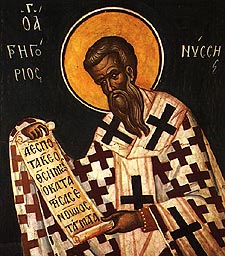|
|||
|---|---|---|---|
| This weekly bulletin insert complements the curriculum published by the Department of Christian Education of the Orthodox Church in America. This and many other Christian Education resources are available at http://dce.oca.org. | |||

Saint Gregory of Nyssa was born into an extraordinary family; history is not sure of his exact birthdate. His maternal grandmother Macrina is a saint of the Church. Her husband was, in Gregory's words, "killed by imperial wrath" –the deadly wrath of the pagan emperor Maximinus. Therefore Gregory believed that his grandfather could rightly be called a martyr for the faith. As for Gregory's own generation, four of his siblings, in a family of nine children, are saints as he is. But most biographers don't describe Gregory as a singularly devout child. An experience he had when he was almost twenty seems to have been decisive and a means of growth for him. Some relics of the saints known as the Forty Martyrs of Sebastea were brought to a chapel near the family home, and Gregory's contemplation of these relics led him to understand that it is possible to give one's whole life to God. He regarded his own spiritual life more seriously then, and began on his personal path of serving God with all he had. Gregory was emotionally close to his siblings. He had been through difficulties with his older brother Basil, who all but forced him to become a bishop. It was a position to which he was ill-suited and which he was not able to manage well, even being falsely accused of mishandling funds. Nevertheless, when Basil died in 378 before turning fifty, Gregory was devastated. He put his grief into the huge but important task of finishing Basil's great work "The Six Days of Creation" (Hexaemeron), which Basil had not yet completed at the time of his death. The next year brought another terrible blow, when Gregory's beloved older sister Macrina died. She had been his mentor and teacher, as he freely acknowledged. He wrote a beautiful tribute to her that describes the ways in which her noble character affected him, and also tells us a great deal about the life of the Church at that time. Gregory continued to write, developing his conviction that God has created us to grow constantly closer to Him. One of his best-known works is based on II Corinthians 3: 18, in which Saint Paul writes that we are being transformed "from glory to glory".
Gregory relates this growth to baptism, or "regeneration" as he calls it. He writes that in baptism "we shall not, according to the Jew Nicodemus and his somewhat dull intelligence, change the old man into a child, nor shall we form anew him who is wrinkled and gray-headed to tenderness and youth...but we do bring back, by royal grace, him who bears the scars of sin, and has grown old in evil habits, to the innocence of the babe." This "royal grace" makes baptism a way for us to grow--to become as innocent as babes, which means being completely dependent on God. In so doing we become stronger than giants. |
|||
